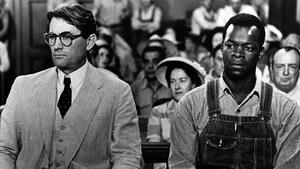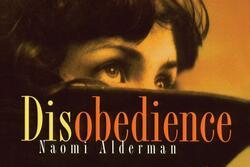Sorkin's Reclaiming of a Feminist Classic
From a woman-focused Oklahoma! to a revamped Tootsie to a one-woman show about the magic of the Constitution despite its failure to protect women, this was the Broadway season of feminist reclamation. That is, except for one show: Aaron Sorkin’s To Kill a Mockingbird. Sorkin managed to take a text written by a woman and rewrite it from a man’s perspective.
Sorkin’s play has been heralded by The New York Times, Variety, and others for maintaining the narrative integrity of Harper Lee’s classic novel. But the stage production eliminated one central element of the plot: the female protagonist. Although Scout is heavily featured as a narrator in the play, she is in no way the main character, and her gender is all but ignored.
Instead, Sorkin focuses on Atticus, using the trial of Tom Robinson as a framing device. The play never acknowledges that women in 1920s Alabama couldn’t serve on a jury. And, in addition to this blindspot, the courtroom scenes are actually some of the most problematic from a feminist perspective. Lee takes care to ensure the reader empathizes with Mayella Ewell, a woman raped by her father and pushed to accuse the African-American Tom Robinson. However, in Sorkin’s play, Atticus skewers her on the stand and reduces her to a puddle of sniveling racism. Both Lee’s novel and Sorkin’s play make a point of dispelling the myth of the “black rapist”, but Sorkin’s version, in its exclusion of the gender conversation, lacks important nuance. Sorkin casts Mayella as whiny and malicious, denying her the empathy she deserves as a victim of abuse. Racism in America has never existed in a vacuum. Racist and patriarchal power structures are bound up in each other. Sorkin’s play forgets (or ignores) this and fails to challenge racist ideas in their full complexity.
I’ll admit that the show is beautifully written. Its commentary on race was energizing and moving. And I’m grateful that the Finch family’s nanny and cook, Calpurnia’s, role was expanded. But Sorkin didn’t need to sacrifice Lee’s carefully constructed gender plotline for resonant messages about race. In the novel, Scout struggles to reconcile her love for adventure and coveralls with the expectation that she will conform with normative femininity. Giving space to Scout’s internal struggle would have added to the play’s exploration of race, rather than distracted from it. The play could have delved into the ways in which traditional models of white femininity uphold white supremacist patriarchy.
Not only does the play ignore Lee’s explicit messaging around gender, it also erases two deeply significant female characters: Miss Maudie and Aunt Alexandra. In the 8th grade, I wrote an essay about womanhood as presented by these two women. If you read that paper having only seen the play, you’d have thought it was based on a different story entirely. In the novel, Aunt Alexandra exemplifies what it means to fill the mold of traditional femininity, even if one has qualms about it. In contrast, Miss Maudie marches to the beat of her own drummer. She winds up as a middle-aged “Miss” rather than “Mrs.”, but she is happy. The two women represent conflicting pressures on Scout, and disparate visions of what it means to be a “lady.” But Scout’s development as a woman and a person are largely ignored. While Jem and Dill mature into young men under Atticus’ guidance, Scout remains childlike, perhaps because as long as she remains prepubescent, there’s no need to discuss her gender.
Sorkin does scratch the surface of the gender conversation once or twice. But where he does, he uses a male point of view. Throughout the play, there are fleeting moments where Sorkin explores gendered expectations through Dill, a nontraditional exemplar of masculinity. While conversations about masculinity are important, they weren’t central to Lee’s work. Femininity, however, was. Toward the end of the play, Bob Ewell, irate at Atticus’s questioning of the daughter whom he abused, yells, “One day your daughter will have something else to do with that mouth...” This is the only other place that gender is explicitly mentioned. It is also the one moment we see Atticus snap and respond aggressively, simply perpetuating a patriarchal model of feminism in which good men stand up to protect women.
Rather than present a story about what it means to be a woman in the south, Sorkin explores what it means to be a man. Maybe it’s only natural for writers to want to see themselves reflected in the work they produce. But if Sorkin wanted that sort of representation, he shouldn’t have chosen to adapt a feminist novel written by a woman.








Thanks for this piece. Do I have your permission to reference it for something I'm writing in response to Sorkin's adaptation (just for my own blog). I found the courtroom harassment of Mayella and Sorkin's decision to turn her into a white supremacist replica of Dad very problematic.